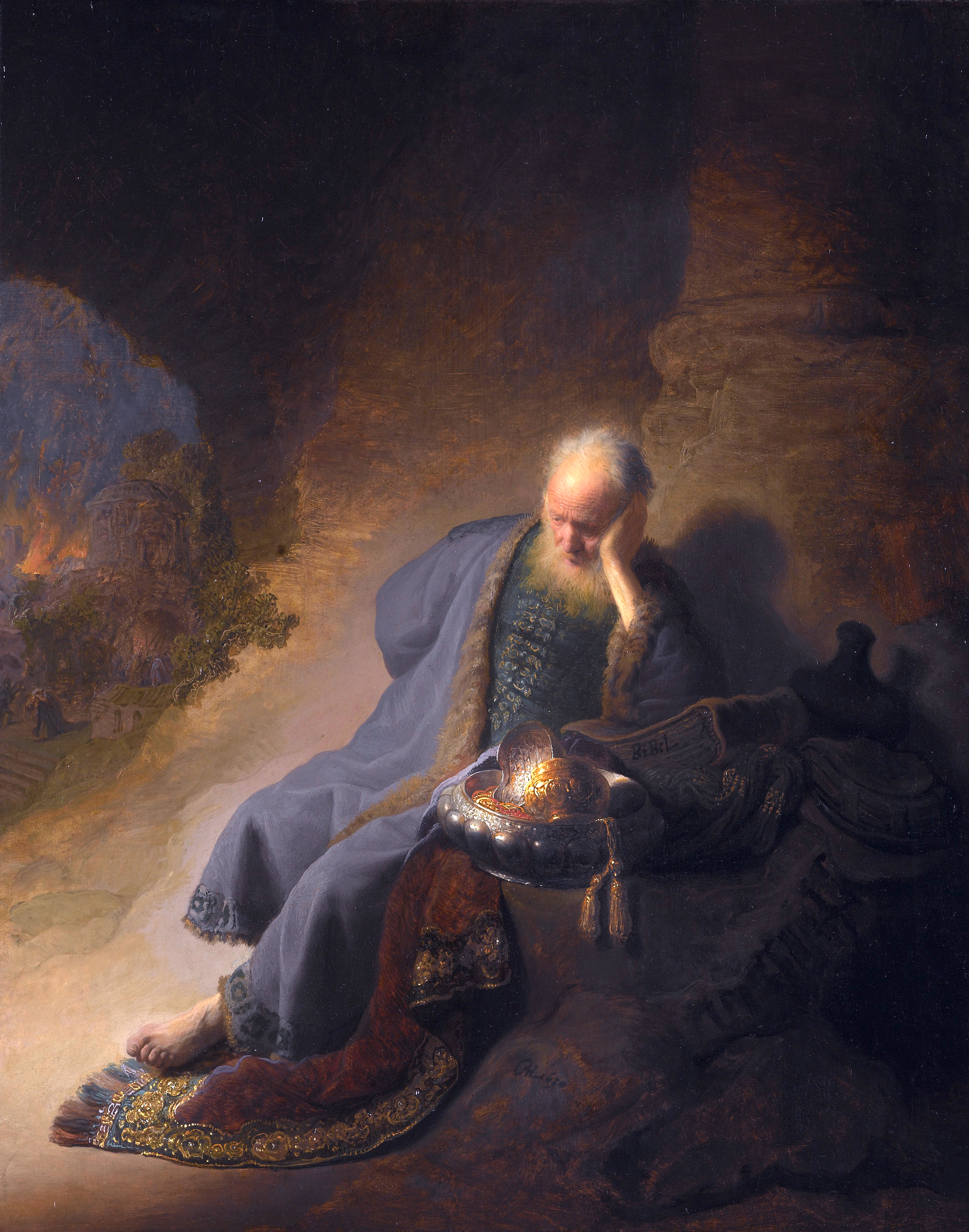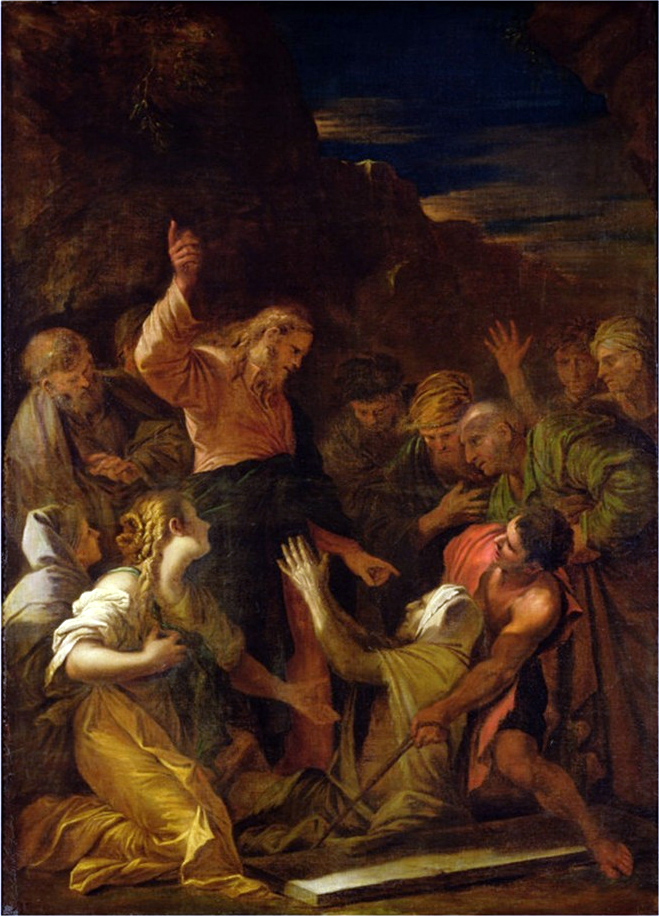
This one was written by Josh Musser Gritter:
Recently my friend reminded me of something Jewish theologian, Abraham Joshua Heschel, once said. He said that we so often live the life of faith in the world of production. We produce, work, build, make. Most of our lives are spent in the rat-race achieving rather than receiving, building Babel-towers, trying to grasp at our worth. But the deep life of relationship with God, says Heschel, is not found in the world of production, but rather in the abyss, in Sheol, the place where we are brought down to our knees—down into down into loss, fear, grief, anger, and befuddlement. Lord knows Sheol is the Hebrew word for yet another Zoom meeting. But I digress.
 How easy it was when things were normal to forget that most of our holy script was written to and by people in the abyss, a nation brought collectively to its knees. Scholars would remind us that the Torah was not composed by a religious elite from within the comfortable confines of the Jerusalem temple. No, its combustive imagination was forged in the fires of Babylonian exile. Perhaps this is why the Jewish people have produced some of the greatest art and literature the world will ever see. As Caleb Wilde says in his brilliant book, Confessions of a Funeral Home Director, suffering can either close your heart in on itself—what Augustine called incurvatus in se (curving or lapsing in oneself). Or it can break your heart open—excurvatus ex se (unfurling ourselves to the world). The story of Israel is that of being continually broken open to the possibility of hope. Forty years of slavery in Egypt, forty years in the wilderness, fifty years in Babylonian exile, five years in Auschwitz. Tack on to this Paul’s prison letters and John’s apocalyptic exile and one must come to the timely conclusion that the Bible was written in communal solitary confinement—go figure.
How easy it was when things were normal to forget that most of our holy script was written to and by people in the abyss, a nation brought collectively to its knees. Scholars would remind us that the Torah was not composed by a religious elite from within the comfortable confines of the Jerusalem temple. No, its combustive imagination was forged in the fires of Babylonian exile. Perhaps this is why the Jewish people have produced some of the greatest art and literature the world will ever see. As Caleb Wilde says in his brilliant book, Confessions of a Funeral Home Director, suffering can either close your heart in on itself—what Augustine called incurvatus in se (curving or lapsing in oneself). Or it can break your heart open—excurvatus ex se (unfurling ourselves to the world). The story of Israel is that of being continually broken open to the possibility of hope. Forty years of slavery in Egypt, forty years in the wilderness, fifty years in Babylonian exile, five years in Auschwitz. Tack on to this Paul’s prison letters and John’s apocalyptic exile and one must come to the timely conclusion that the Bible was written in communal solitary confinement—go figure.
As the very air we breathe and the things we touch feel dangerous to us, we are beginning to ask afresh the fundamental questions that Israel asked of itself all the way from the ash pits of Babylon to the slave-fires of Egypt. Is the world beautiful, or is it a cold, dark place? When all is stripped away, what will we become? What is going on inside us? What does faith look like when we’ve been forced to our knees? Will we hang our harps in Babylon’s trees (Psalm 137:1), or will the Lord fill the speechless with songs of joy (Isaiah 35:6)? In this the exile of our days, it is important to remember that we are not the first ones to have our world turned upside down.
Turns out exilic life in the abyss is what following Jesus was really like. Take Jesus’ disciples for example. One day they were fishermen, steady income in the family business, and then Jesus said those fateful words, “Come, follow me.” Luke summarizes their abrupt change in destiny well: “they left everything” (Luke 5:11; emphasis mine). Jesus must’ve called them on Ash Wednesday. And as if leaving everything weren’t enough, just read on to the next verse:
“When he was in one of the cities, there was a man covered with leprosy” (Luke 5:12; emphasis mine).
Leprosy was highly contagious. The book of Leviticus outlines in immense detail—an entire chapter’s worth—the step-by-step protocol one is to go through when infected. The Israelite priest would act like a sort of ancient CDC, inspecting and testing the person who is showing symptoms. If the test was positive, the leprous person was declared unclean and was quarantined for 7 days so as to not spread the disease (Leviticus 13). After 7 days it was another trip to the priest. If still infected, quarantine measures would continue for 7 more.
To be bodily unclean and quarantined meant no participation in worship, no public gatherings—it meant not just social distancing, but extreme isolation. In other words, the leprous man walked around wearing a big neon sign that said, “infected.” But this man didn’t just have leprosy. Luke says he was covered with it. The disease was everywhere. And now this man remains nameless—leprosy, his disease, is all anyone knows about him.
Fresh off the fishing boat, the small-town fledgling disciples from nowheresville now find themselves in the big city, face-to-face with the possibility of infection and the prospect of societal uncleanliness. Jesus doesn’t seem to pay the Levitical code or cultural stigma any mind. As the leprous man crosses the 6-foot barrier required for social distancing measures, I imagine the disciples are applying hand sanitizer in the background—if there’s any left on the shelf that is.
“When the man saw Jesus, he bowed with his face to the ground and begged him” (Luke 5:12).
 With his face to the ground, he begged him. Sounds like just another Tuesday in pandemic America. That has become my posture these last few weeks. Face to the ground, not sure what to say, not sure what to do, not sure what to think. And with his face to the ground the man mutters under his breath,
With his face to the ground, he begged him. Sounds like just another Tuesday in pandemic America. That has become my posture these last few weeks. Face to the ground, not sure what to say, not sure what to do, not sure what to think. And with his face to the ground the man mutters under his breath,
“Jesus, if you choose, you can make me clean” (Luke 5:12).
At first, Jesus does not speak. And then he does something unthinkable, unimaginable. I will never read these words the same again after this pandemic.
“Then Jesus stretched out his hand and touched him” (Luke 5:13).
As the foggy sadness of unknowing haunts me, as I stare at my Bible feeling absolutely incapable to find a word to say to my weary congregation, I imagine Jesus standing there in front of me. My head is bowed to the ground in shame, in guilt, in powerlessness. I am lonely and covered in fear and anxiety, begging for answers. And then Jesus reaches out his hand and he touches me. He touches all of us. Touches our despair, touches our isolation, touches our attempt to do the pandemic better than others. Apparently, there is one for whom social distancing does not apply. Maybe our prayer for today simply could be, “Lord, if you choose, you can make me clean.”
The good news is that he does choose. The bad news for Jesus is that touching us will come at an immeasurable cost to God. We have now become familiar enough with the pandemic protocols to know what will happen to Jesus when he touches all that now infects us—he too will be infected. Jesus will feel it all, become it all. This is not just the story of the healing of a sick man, it is also the story of the spread of a disease to God. It was an early church father who said, “Christ cannot redeem that which he does not taste.” Well, now Jesus gets a Golden Corral-buffet-sized taste of human brokenness. Jesus is covered in disease, covered in uncleanness, covered in sin. It’s everywhere.
Thanks be to God that we, like the leprous man, will make it out of this. As Rainier Rilke once said, “No feeling lasts forever.” All we have to do is go to the priest to prove that we’ve recovered.
But I cannot help but notice that Jesus never goes to the priest. Jesus remains infected. His life and ministry will be one of perpetual infection and Levitical uncleanness. One day we will return to normalcy, to a world beyond corona, but Jesus will not, not on this side of Good Friday. As far as my church’s health policy is written, Jesus won’t be allowed in our sanctuary when we reconvene our worship. He’ll make his home elsewhere—in the hospital ICU’s, in the soup-kitchen breadlines, in the living rooms of weary parents, in the confused hearts of beautiful children, and in the weary words of this bone-tired pastor. He will carry the virus we gave him all the way to Calvary. And as Sufjan Stevens reminds us, “There’s no shade in the shadow of the cross.” But there on the cross, this virus doesn’t have a snowball’s chance. For the last enemy to be defeated is death, death and all of its symptoms. Take heart, friends, Jesus will not quarantine himself from you.
Images: Jeremiah Lamenting the Destruction of Jerusalem, Rembrandt; Christ cleansing a leper, Jean-Marie Melchior Doze

COMMENTS
3 responses to “When Jesus Got Infected”
Leave a Reply













Beautiful.
This is just amazing and beautiful. A keeper to come back to over and over.
Very insightful, found this to be a blessing and enlightening. Always good to receive a new perspective on the word of God.